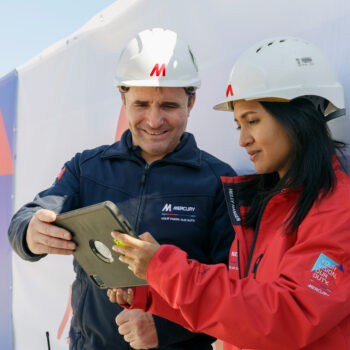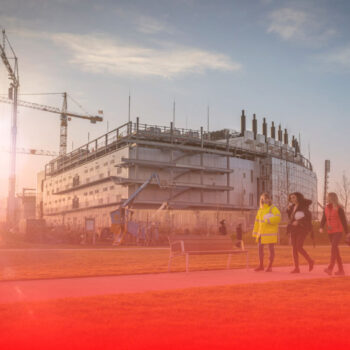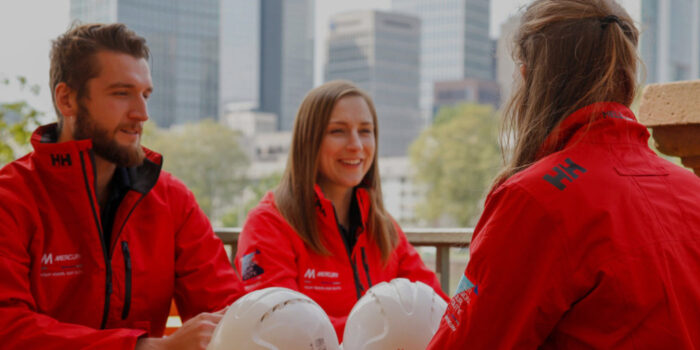News & Insights

Harnessing high power computing to push digital construction to the edge
At Mercury, we recognize the prominent role that Building Information Modelling (BIM) plays in the delivery of projects for our global clients. As part of Digital Edge – our digital transformation strategy – we work to ensure that our frontline people have the right technology to enable them to deliver real value to our clients, pushing digital construction to the edge.
We pride ourselves on being at the forefront of new technology and are one of Europe’s first contractors to implement Hewlett Packard’s (HP) latest ZCentral 4R solution for our BIM team. By centralising device and resource management, our global teams can utilise high-powered computing power and performance that allow us to upscale on projects instantly, while efficiently managing resources.
Sean Dowd, Mercury’s Group BIM Manager, was recently interviewed by Silicon Republic, Ireland’s leading tech news website, where he spoke about how Mercury harnesses cutting edge technology to solve construction’s most prominent challenges, while continuing to deliver best-in-class projects throughout all of the sectors in which we operate.
You can read Sean’s full interview below.
How does Mercury use cutting-edge technology to empower our global workforce?
“With over 270 staff, we have one of the largest BIM operations in Europe. However, you need more than a great BIM team to be a leader in digital construction. Our BIM team is constantly seeking innovative and cutting-edge digital technologies which enables more efficient design and construction. To best serve the organisational growth of our clients, we have implemented a robust training strategy and have invested in state-of-the-art facilities and equipment.

“We work with key strategic partners who provide us with tools and solutions to deliver client visions through best-in-class construction solutions. By centralising device and resource management through ZCentral 4R, our teams can utilise high-powered computing power and performance that allow us to upscale on projects instantly, while efficiently managing resources. Laptops used in the design and render process are available to our global BIM team members, reducing downtime and increasing project efficiency and turnaround, allowing users to collaborate from anywhere in the world, without drops in performance.”

“We have simplified our computing-resources globally through a centralised hub in Ireland, delivering a secure access point that is available for our remote work force around the globe. This provides us with flexibility and agility that allows us to collaborate with our global clients and was particularly useful during the Covid-19 pandemic. We’ve recently committed to further expanding our capabilities.”
How does technology feed into Mercury’s approach to project delivery?
“With projects based across 13 countries and many team members working remotely across the globe, Mercury offers standardised software and hardware solutions to ensure we meet our team and client needs. Our BIM operations are certified to the highest possible standards; having achieved the BSI accreditation and Kitemark for ISO 19650 as a Lead Appointed Party (Tier 1 Contractor).”
“Technology is how we future-proof our business. We are always pushing boundaries and need platforms that are fully tested and reliable to keep up with the demand and expectations of clients.”
“Over the past five years we have heavily invested in the improvement of our BIM capabilities, facilities and equipment, and opened our Digital Core in Maynooth, Co. Kildare. Teams based in this state-of-the-art facility can avail of our purpose-built, on-site Virtual Reality (VR) lab, as can a number of construction teams with dedicated VR rooms on many of our project sites.”
What are some of the biggest challenges when it comes to digitally delivering new projects in Mercury’s key sectors?
“Regardless of sector, timelines are getting shorter for all projects. Clients want projects completed as quickly as possible, to the highest standards. With the BIM team strategically placed at the front of each project, it is imperative that we can be mobilised quickly. Having the right equipment and software is a key part of this turn around and allows our team to be more productive, with less overhead at the project bottom line.”
How does sustainability feed into the work that you do?
“Mercury has developed design and construction workflows that allow for environmental impact benefits through the use of project BIM Models. Using the 3D digital construction model, we can calculate improvement of the project’s construction carbon footprint, by modifying material quantities specification and suppliers to reduce the carbon footprint and increase the long-term sustainability of projects. Our Planet, Our Duty, our responsible business plan highlights the role that our supply-chain and partners play in helping us to achieve our sustainability objectives.”
A version of this interview first appeared on Silicon Republic on Friday 4th February. Click here to read the article.
Digital Edge – A Beyond50 Pillar
Our BIM programme forms part of Mercury’s Beyond50 strategy, as part of the ‘Digital Edge’ pillar. Digital Edge aims to ensure that our frontline people have the right technology to enable them to deliver real value to our clients, pushing digital construction to the edge.
Like Mercury on Facebook.
Follow us on LinkedIn, Twitter, and Instagram.


